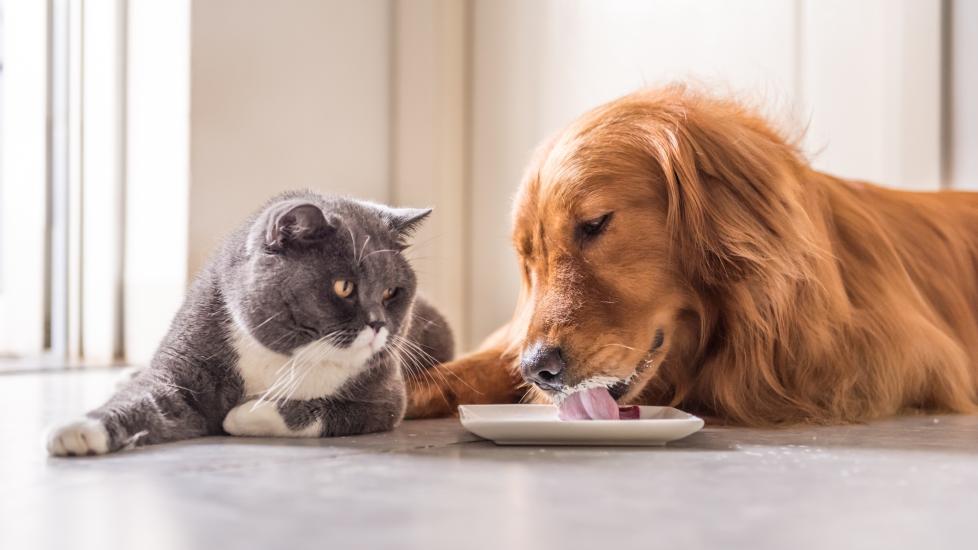Can Dogs Drink Milk?
Though the myth that cats can drink milk is more common, you may also wonder whether dogs can have milk. But, much like cats, sharing milk with your pup isn’t the best idea. Here’s what to know about milk and what dogs and puppies can safely drink.
Is Milk Good for Dogs?
Milk carries more risks than benefits for the average dog, although a small amount is probably safe for a dog that isn’t sensitive to dairy products. Milk contains some nutrients, including protein and calcium, but dogs get these in the well-rounded commercial diet they already eat.
Milk also contains a large amount of fat, natural sugars, and calories; it can lead to obesity, pancreatitis, and a variety of other problems if consumed in large amounts. It can also lead to gastrointestinal upset, including vomiting, diarrhea, flatulence, and abdominal pain, even when drunk in moderate amounts. Over time, dogs can develop allergies to the proteins in milk as well.
Are Dogs Lactose Intolerant?
Yes, dogs can be lactose intolerant. Dogs are born with the enzymes needed to digest their mother’s milk, which is more nutrient-dense and contains less lactose than cow milk. Over time, dogs may lose the enzymes they need to digest the milk that nourished them as puppies. This means they become more sensitive to the lactose present in milk, particularly when it’s offered in large amounts.
Signs of lactose intolerance will appear in some dogs regardless of how much dairy they ingest. Vomiting, diarrhea, gas, bloating, abdominal pain, and decreased appetite after drinking even a small amount of milk may be secondary to lactose intolerance in dogs. If these signs are severe or persist more than 12 hours, contact your veterinarian for advice.
Can Dogs Drink Milk Alternatives?
Although whole milk isn’t a good idea for dogs, sharing milk alternatives isn’t recommended either. This includes almond milk, oat milk, soy milk, and coconut milk. These milks, although they are plant-based, are generally relatively high in calories and fat—things Fido doesn’t need.
Additionally, milk alternatives often have added sugars or sweeteners, some of which (such as xylitol) may actually be toxic to your pup.
All of these milks can result in vomiting and diarrhea, especially if drunk in excess, and some dogs may be allergic to their primary ingredients. It’s safest to just say no to milk alternatives for your pooch.
Can Puppies Drink Milk?
Puppies can safely drink dog milk and weaning formulas made specifically for them (such as Esbilac®). But puppies should not be offered other milks, such as cow milk or goat milk, which are not created with dogs in mind and may be too rich in some components and deficient in others.
Once a puppy has been weaned, milk is no longer needed and a balanced commercial puppy food gives them all the nutrients they need.
Puppies should not be offered other milks, such as cow milk or goat milk, which are not created with dogs in mind and may be too rich in some components and deficient in others.
What Can a Dog Drink Besides Water?
The best, safest, and most nutritious way to hydrate your dog is with water. All dogs need constant access to water, and you can also give it to them by freezing water inside a Kong® toy so they can lick the ice.
Many popular drinks for humans are dangerous for dogs, including:
-
Juice and commercial adult electrolyte replacers generally have a lot of added sugar or other sweeteners that aren’t healthy for your pup
-
Tea and coffee have way too much caffeine for dogs
-
Alcohol is a bad idea under all circumstances and can lead to alcohol poisoning
-
Vegetable juices can trigger vomiting and diarrhea
So, if you are looking for something for your pup to drink, stick to water.
Featured Image: chendongshan/iStock / Getty Images Plus via Getty Images
